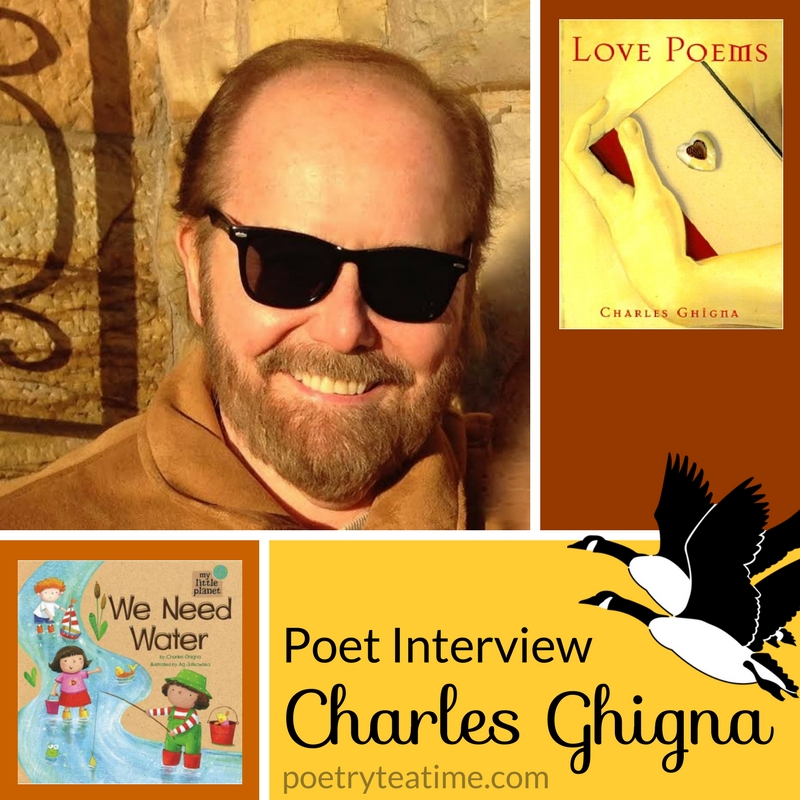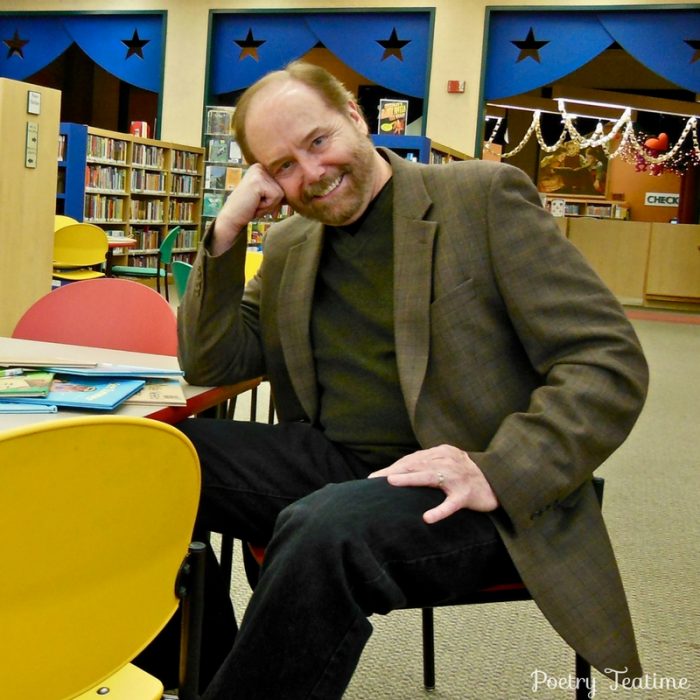Today we’re delighted to welcome, at long last, Charles Ghigna! Fondly known as “Father Goose,” Charles Ghigna lives in a treehouse in the middle of Alabama. He is the author of more than 100 award-winning books and more than 5,000 poems, which have appeared in textbooks, newspapers, and magazines from The New Yorker and to Cricket and Highlights. He has spoken at events throughout the U.S. and overseas, and has read his poems at The Library of Congress, the John F. Kennedy Center for the Performing Arts, the American Library in Paris, the American School in Paris, and the International Schools of South America. For more information, please visit his website at FatherGoose.com. Without further ado, here is the interview!
[This post contains Amazon affiliate links. When you click on those links to make purchases,
Poetry Teatime receives compensation at no extra cost to you. Thank you!]
Welcome, Charles! Let’s begin with a question about your name. How did you come to have the “Father Goose” moniker?
Many years ago when I first started visiting schools to present my poetry programs, students and teachers began calling me "Father Goose." The name stuck. It was a lot easier to say than Mr. Ghigna -- and a lot easier to spell. The Walt Disney Company suggested I use that moniker for one of my first books with them, TICKLE DAY: POEMS FROM FATHER GOOSE. Cyd Moore created the first image of Father Goose. Other illustrators have continued the tradition, sometimes including a goose or two in my new books. Now I'm more often called Father Goose than my real name!
That’s fantastic! On another note, you’ve dedicated many of your books or individual poems to members of your family. How does poetry help us remember or celebrate loved ones?
My wife, children, and grandchildren continue to inspire my poems. I like to think of each new poem and each new book as a tribute to them, little celebrations of how the lives of our loved ones live on, preserved in endless pages of poetry.
What is the achievement you are proudest of?
My greatest achievement is my family, meeting the love of my life and together creating children and grandchildren who love and inspire us. In terms of my writing, the achievements I'm most proud of are always my latest books. Each new "baby" makes me proud.
The newest member of our family is our new book that will be published by Time Inc Books and Animal Planet in October, STRANGE, UNUSUAL, GROSS & COOL ANIMALS. It is one of the biggest books I've ever written and filled with exotic animals from around the world. Many of them are newly discovered. Each section begins with a poem introducing the Strange, Unusual, Gross, and Cool animals in that section. That book is dedicated to my grandchildren, Charlotte Rose Ghigna and Christopher Pierce, to my editors, and to my wife, Debra, my editor-in-residence.
Your poems appear on SAT and ACT tests. How would you suggest assessing an understanding of poetry? Should poetry be assessed?
That's an excellent question. At the risk of never having another poem of mine chosen for testing materials, I have to be honest and say that I think the mere idea of asking test questions about a poem is absurd. It's like asking why does a butterfly fly. We can catch one and pull it apart to analyze it, but when we are finished with it all we have is a dead butterfly. Poems are like that. They are simply meant to fly, simply meant to be. As Robert Frost once answered when asked to explain one of his poems, "What would you like me to do, say it over again in worser English?" I write poems for children to help them celebrate the joy and wonder of their world and to look at their lives from the inside out. I write humorous poems to tickle the funny bone of their imaginations.
You’ve mentioned that you’re working on a young adult novel written in verse. How is the process of writing a novel in verse different than writing other poems? What are the most rewarding or most challenging aspects of a verse novel?
My verse novel contains two voices, two teens, writing back and forth to each other in their private diaries, opening their hearts to each other with each new entry. Thus, each poem in my verse novel is written as a personal apostrophe, an open address to the other, much like two dramatic monologues spoken back and forth in a reader's theatre kind of play.
What’s your most “contrarian” (contrary to common practice) piece of advice when writing or reading poetry?
Ha! I like that question a lot. My best advice is to simply write every day, listen to your own natural voice as you write, and slowly develop that voice into your own distinct style. Remember, style is not how you write, it is how you do not write like anyone else.
Many writers think they must rush to writing workshops to learn how to write. Call me a "contrarian," but I would suggest the opposite. Think of all the great writers you know. How many of them learned to write by attending a workshop? They learned to write by writing. Writing is a solitary art. Not a group effort. The only technique you need to learn is the famous BIC technique. Butt In Chair. As I wrote in Harold Underdown's popular guide book THE COMPLETE IDIOT'S GUIDE TO PUBLISHING CHILDREN'S BOOKS:
"Stop attending workshops. Read other poets, but for heaven sakes save your soul and stay away from how-to workshops and conferences. At worst, they'll drain you of your own natural creativity. At best they'll have you writing like everyone else. There's nothing more uninteresting than the workshop poem. Keep what little originality you have left from childhood. Protect it. Nurture it. Let it run wild. That's all you have. That's all you need. The only way to learn to write is to write. There is no other way. Workshops and conferences can only take you away from the real work -- the real world of writing."
Thank you so much, Mr. Ghigna, for joining us today! Be sure to check out the website FatherGoose.com and look for his books at your local library or through the links below to learn more.
Animal Planet Strange, Unusual, Gross & Cool Animals
Score!: 50 Poems to Motivate and Inspire



